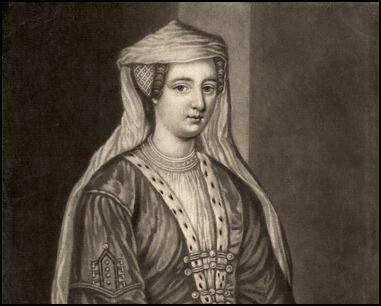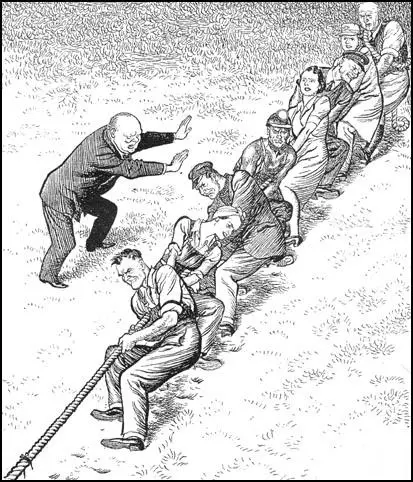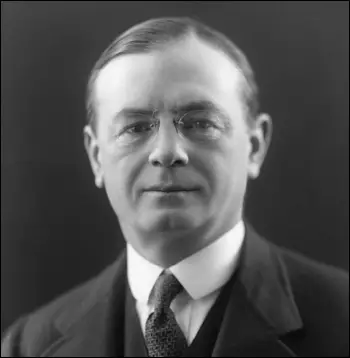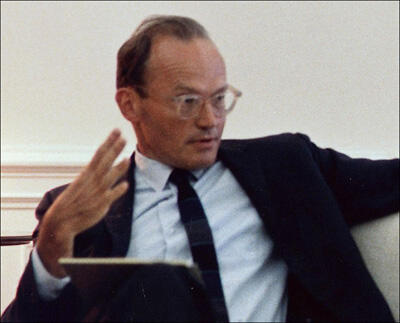On this day on 16th September
On this day 1295 Elizabeth de Clare, the youngest daughter Gilbert, 9th Earl of Clare, was born on 16th September 1295. Elizabeth married John de Burgh, son of the Earl of Ulster, when she was 14 but he died five years later. While Elizabeth was waiting for her inheritance, the marcher lord, Theobald Verdun kidnapped her and took her to his castle at Alton where he married her against her will. However, Theobald Verdun died six months after the wedding.
Edward II decided to keep Elizabeth in custody at Bristol Castle. The following year, she was granted her share of the Clare inheritance when she agreed to marry Roger Damory, another one of the king's supporters.
In 1322 Roger Damory changed sides and fought for the Earl of Lancaster at Boroughbridge. Damory was captured during the battle and was later executed for treason. Elizabeth had remained loyal to Edward and she was allowed to keep her estates. The king now decided it would be better if Elizabeth remained a widow.
Elizabeth was one of the richest women in England. However, unlike a lot of rich people, Elizabeth believed it was important to help the poor. Her accounts show that in one five-month period she gave help to over 5,000 different people. Of these, 800 received a daily allowance from Elizabeth.
Elizabeth de Clare disagreed with the view that serfs should not go to school. She arranged for a large number of people who lived in her villages to be educated. She also paid for those boys who showed talent to be educated at Oxford and Cambridge universities.
In 1336 Elizabeth supplied the money for the foundation of Clare College, Cambridge. This provided an education for twenty scholars. As well as donating a considerable amount of money she also became involved in deciding what the students should study. Students at Clare College attended lectures on law, medicine, religion and the arts.
Elizabeth de Clare died ion 4th November 1360.

On this day 1944 it is reported in The East Grinstead Observer that a man is sent to prison for refusing to become a coalminer.
"Christopher Bates, 1 Balls Green, Withyham, was sent to prison for 21 days by East Grinstead Magistrates on Monday for refusing to work down the coal mines as directed. The defendant stated that he had suffered from pains in the head, and had a fear of going underground. He stated he was a keen member of the Home Guard and had volunteered for the Royal Navy but had not been called up."

On this day 1955 politician Leo Amery died in London.
Leopold (Leo) Amery was born in Gorakhpur, India, on 22nd November, 1873. Educated at Harrow and Balliol College, Oxford, he worked as chief correspondent for The Times during the Boer War. He also edited seven volume, The Times History of the South African War (1900-09).
A member of the Conservative Party, in 1911 Amery was elected to represent Birmingham Sparkbrook, in the House of Commons. In the government headed by David Lloyd George, he served as under-secretary of state for the colonies (1919-21). This was followed by the post of First Lord of the Admiralty (1922-24) and then colonial secretary (1924-29).
Amery lost office when Ramsay MacDonald and the Labour Party formed the government in 1929. He remained out of office throughout the 1930s and emerged as one of the party's leading critics of the government's appeasement policy.
In 1940 Neville Chamberlain appointed Amery as secretary of state for India and Burma. His son, John Amery, made pro-Nazi broadcasts during the Second World War. He also made speeches in favour of Adolf Hitler in occupied Europe and after the war was executed for high treason.
After his retirement from politics Leo Amery published his autobiography, My Political Life (1955).

On this day 1996 McGeorge Bundy died of a heart-attack.
McGeorge Bundy was born in Boston, Massachusetts, on 30th March, 1919. After graduating from Yale University in 1940 he joined the office of Facts and Figures in Washington. After the Second World War he took up a teaching appointment at Harvard University. Eventually he became Dean of Arts and Sciences (1953-61).
When John F. Kennedy was elected he appointed Bundy as his National Security Adviser. William Attwood was the leading advocate inside the Kennedy Administration for talking to Fidel Castro about the potential for improving relations. He was supported by Bundy who suggested to Kennedy that there should be a "gradual development of some form of accommodation with Castro".
In April 1963 Lisa Howard arrived in Cuba to make a documentary on the country. In an interview with Howard, Fidel Castro agreed that a rapprochement with Washington was desirable. On her return Howard met with the Central Intelligence Agency. Deputy Director Richard Helms reported to John F. Kennedy on Howard's view that "Fidel Castro is looking for a way to reach a rapprochement with the United States." After detailing her observations about Castro's political power, disagreements with his colleagues and Soviet troops in Cuba, the memo concluded that "Howard definitely wants to impress the U.S. Government with two facts: Castro is ready to discuss rapprochement and she herself is ready to discuss it with him if asked to do so by the US Government."
CIA Director John McCone was strongly opposed to Lisa Howard being involved with these negotiations with Castro. He argued that it might "leak and compromise a number of CIA operations against Castro". In a memorandum to McGeorge Bundy, McCone commented that the "Lisa Howard report be handled in the most limited and sensitive manner," and "that no active steps be taken on the rapprochement matter at this time."
Arthur Schlesinger explained to Anthony Summers in 1978 why the CIA did not want John F. Kennedy to negotiate with Fidel Castro during the summer of 1963: "The CIA was reviving the assassination plots at the very time President Kennedy was considering the possibility of normalization of relations with Cuba - an extraordinary action. If it was not total incompetence - which in the case of the CIA cannot be excluded - it was a studied attempt to subvert national policy."
Lisa Howard now decided to bypass the CIA and in May, 1963, published an article in the journal, War and Peace Report, Howard wrote that in eight hours of private conversations Castro had shown that he had a strong desire for negotiations with the United States: "In our conversations he made it quite clear that he was ready to discuss: the Soviet personnel and military hardware on Cuban soil; compensation for expropriated American lands and investments; the question of Cuba as a base for Communist subversion throughout the Hemisphere." Howard went on to urge the Kennedy administration to "send an American government official on a quiet mission to Havana to hear what Castro has to say." A country as powerful as the United States, she concluded, "has nothing to lose at a bargaining table with Fidel Castro."
William Attwood read Howard's article and on 12th September, 1963, he had a long conversation with her on the phone. This apparently set in motion a plan to initiate secret talks between the United States and Cuba. Six days later Attwood sent a memorandum to Under Secretary of State Averell Harriman and U.N. Ambassador Adlai Stevenson. Attwood asked for permission to establish discreet, indirect contact with Fidel Castro.
On September 20, John F. Kennedy gave permission to authorize Attwood's direct contacts with Carlos Lechuga, the Cuban ambassador to the United Nations. According to Attwood: "I then told Miss Howard to set up the contact, that is to have a small reception at her house so that it could be done very casually, not as a formal approach by us." Howard met Lechuga at the UN on 23rd September 23. Howard invited Lechuga to come to a party at her Park Avenue apartment that night to meet Attwood.
The next day William Attwood met with Robert Kennedy in Washington and reported on the talks with Lechuga. According to Attwood the attorney general believed that a trip to Cuba would be "rather risky." It was "bound to leak and... might result in some kind of Congressional investigation." Nevertheless, he thought the matter was "worth pursuing."
On 5th November 5, Bundy recorded that "the President was more in favor of pushing towards an opening toward Cuba than was the State Department, the idea being - well, getting them out of the Soviet fold and perhaps wiping out the Bay of Pigs and maybe getting back into normal." Bundy designated his assistant, Gordon Chase, to be Attwood's direct contact at the White House.
Attwood continued to use Lisa Howard as his contact with Fidel Castro. In October 1963, Castro told Howard that he was very keen to open negotiations with Kennedy. Castro even offered to send a plane to Mexico to pick up Kennedy's representative and fly him to a private airport near Veradero where Castro would talk to him alone.
John F. Kennedy now decided to send William Attwood to meet Castro. On 14th November, 1963, Lisa Howard conveyed this message to her Cuban contact. In an attempt to show his good will, Kennedy sent a coded message to Castro in a speech delivered on 19th November. The speech included the following passage: "Cuba had become a weapon in an effort dictated by external powers to subvert the other American republics. This and this alone divides us. As long as this is true, nothing is possible. Without it, everything is possible."
Kennedy also sent a message to Fidel Castro via the French journalist Jean Daniel. According to Daniel: "Kennedy expressed some empathy for Castro's anti-Americanism, acknowledging that the United States had committed a number of sins in pre-revolutionary Cuba." Kennedy told Daniel that the trade embargo against Cuba could be lifted if Castro ended his support for left-wing movements in the Americas.
Daniel delivered this message on 19th November. Castro told Daniel that Kennedy could become "the greatest president of the United States, the leader who may at last understand that there can be coexistence between capitalists and socialists, even in the Americas." Daniel was with Castro when news arrived that Kennedy had been assassinated Castro turned to Daniel and said:"This is an end to your mission of peace. Everything is changed."
President Lyndon B. Johnson was told about these negotiations in December, 1963. He refused to continue these talks and claimed that the reason for this was that he feared that Richard Nixon, the expected Republican candidate for the presidency, would accuse him of being soft on communism.
McGeorge Bundy continued to serve Johnson as National Security Adviser and was later blamed for being partly responsible for escalating the Vietnam War. In 1966 he left office to become President of the Ford Foundation.
Bundy was also Professor of History at New York University (1979-1989). He was also the author of several books including Presidential Promises and Performance (1980), Danger and Survival: Choices About the Bomb in the First Fifty Years (1988) and Reducing Nuclear Danger: The Road Away from the Brink (1993).


